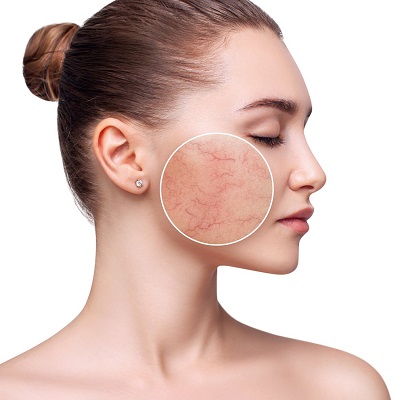
Are you suffering from the skin condition Rosacea? It usually shows up on the face as redness, prominent blood vessels, and now and then acne-like pimples. Patients with this situation may flare up under stress, in warm climates, after consuming some foods, or after drinking alcohol. Many individuals would love to know if Rosacea can be cured permanently. This blog will deal with what it is, what causes it, feasible remedies, and whether there may be a permanent restoration.
Understanding Rosacea:
This long-term skin disorder primarily affects the chin, cheeks, nose, and forehead. It can also cause redness in the eyes. Though the exact origin of rosacea is unknown, numerous factors can cause it. Therefore, heredity, the immune system, the surroundings, etc., can add to its aggravation.
Types of Rosacea:
- Erythematotelangiectatic: It causes redness and shows blood vessels.
- Papulopustular: This type causes swelling and pimples.
- Phymatous: Your skin turns thicker and bumpy, particularly in your nostril if you have this type.
- Ocular: It can cause redness, inflammation, and, every so often, problems seeing.
Rosacea is difficult to manage since every individual exhibits varied indications and degrees of severity.
Can Rosacea Be Cured Permanently?
The quick answer is no if you are curious and want to know if Can Rosacea Be Cured Permanently. You cannot do away with it. Still, it’s miles beyond your control with suitable treatments and lifestyle modifications. With moments of improvement and flare-ups, it is chronic—that is, it typically lasts an entire life. People who have this disease can manage it and can reduce its severity.
Why Is There No Permanent Cure?
This condition is a multifactorial disorder. Therefore, environmental factors and genetics play roles in its causation. It is challenging to develop a permanent remedy since the precise origin is unknown. The illness is also continuous; thus, even if symptoms are under control, they can rise under particular circumstances.
Managing Rosacea: Treatment Options:
Although it is not yet cured, some therapies can help control the symptoms and manage the illness.
Topical Treatments:
Metronidazole is a popular antibiotic that can help lower redness and inflammation brought on by this situation.
You can manage the redness and acne-like outbreaks with azelaic acid.
Brimonidine Gel reduces blood vessels, hence momentarily lessening redness’s appearance.
Oral Medication:
Oral antibiotics like doxycycline occasionally assist people with moderate to severe conditions, mainly if they also have acne-related signs.
Often used to deal with acne, isotretinoin can be administered in severe instances; however, it is generally best taken under tight physician supervision due to negative consequences.
Laser and Light Therapies:
Targeting and reducing the redness and blood vessels visible in people with this can treat it using laser remedy.
Another choice that can help the pores and skin appear healthier and less crimson is a remedy with IPL.
Long-Term Management of Rosacea:
Although this case requires steady management, many people locate fantastic ways to manipulate their signs and symptoms through the use of medicines and adjusting their lives. Working closely with a dermatologist will assist you in creating a treatment plan tailor-made to your signs and causes.
Following a slight pores and skin care regimen is now feasible for management over a lengthy period. Moreover, you must use particular treatments and avoid objects that worsen the condition.
Monitoring your situation and adjusting as necessary: Its signs range with time; for this reason, you need to screen your remedy strategy and make any modifications. Regular visits to your medical doctor will assist make sure that your remedy is still effective.
Exploring New Research and Future Treatments:
Researchers are still investigating novel therapies for this disease that can help regulate symptoms better or perhaps result in a future cure. More studies on the origins of the disease—including how gut bacteria and the immune system interact—may result in more successful treatments.
Emerging Treatments:
- Probiotics: Whether taken orally or on top of their skin, several studies indicate that probiotics could help their sufferers have better skin health and less redness.
- New Medications: Scientists are investigating the creation of novel medications. Taking them orally or applying them to the skin can help with this condition.
Final Thoughts:
It is hard to treat Rosacea completely. If its sufferers know their illness, investigate the various therapies, and make the required lifestyle adjustments, many can lead everyday lives free from much trouble. Those with this long-term illness can have hope since research is still in progress and might result in even better treatments down the road.
Book your appointment at Dynamic Clinic Pk for the most advanced and authentic treatment of Rosacea. We will help you with the best management and cure.


